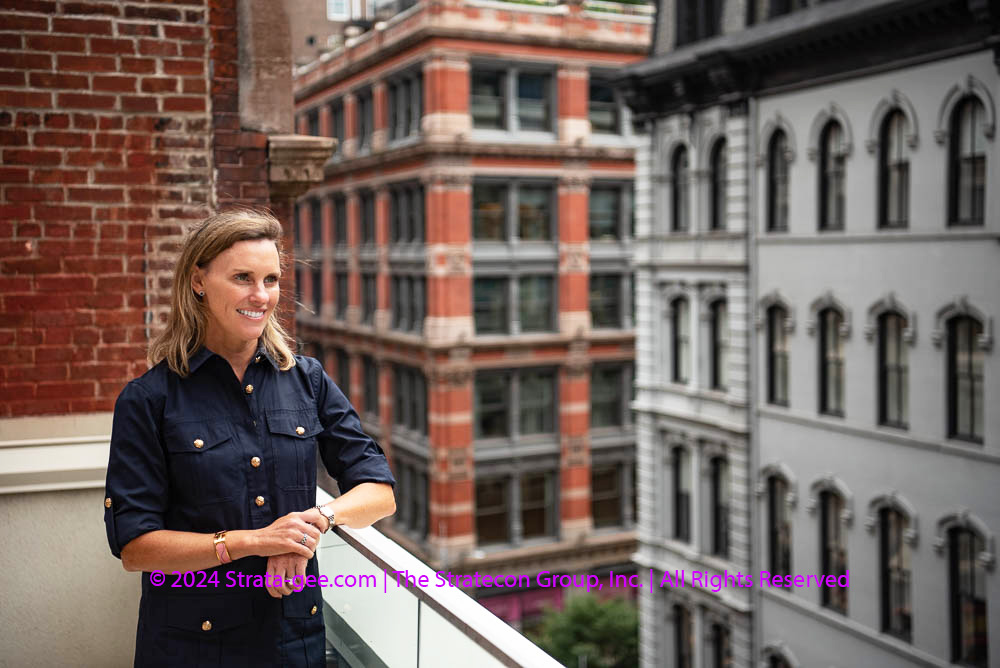
It was a cool fall morning as I headed into New York City for a meeting that I’d been anxiously anticipating for weeks. The skies were gray and rain was definitely threatening, but nothing could dampen my interest in meeting with one of the newest key executives already exerting significant influence in our industry – Hagan Kappler, CEO of Daisy.
Learn all about the unique solution Daisy offers the integration community
We’ve seen past companies pursue a business roll-up strategy – acquiring existing integration businesses to create a national footprint – with no one achieving durable success. We’ve seen a few companies pursue a franchise strategy, attempting to sign up existing integrators or attracting new potential owners to integration – again, no one has created a solution with staying power.
But our industry has never really experienced anything quite like Daisy – a truly unique story. As I was on the train heading into Manhattan, I was anxious to get a read on this new CEO and try to figure out just what type of unique alchemy she has employed that is driving the obvious early success Daisy is experiencing.
An Eye-Opening Experience
It was an eye-opening experience.
We met at the Chief’s Clubhouse on 19th Street in Manhattan, which sits right at the cusp of between lower Manhattan and midtown Manhattan. The Chief’s Clubhouse is part of the Chief organization – a membership organization of vetted high-achieving women executives, and whose stated goal is to “maximize the leadership impact of women executives.”
The organization has clubhouses spread around the country in major cities, and in the case of this one in Manhattan, it occupies several floors in the building. As far as the space itself, it is much like some of the men’s clubs I’ve been in, offering a variety of seating and meeting area options, settings augmented with sometimes dramatic and other times muted lighting, a variety of art on the walls, and with readily available coffee/water/refreshments.
A Different Kind of Executive
Joining Hagan for this interview was Rebecca Hochreiter, Daisy’s Senior Vice President, People and Communications1, who was acting as the host of this event. We settled into comfortable seating surrounding a fairly large round-top table near the windows and quickly learned that we had things in common. For example, both Hagan and Rebecca are from the East Coast, where I am based…and Kappler has four children, as do I. And, obviously, we are all gainfully employed in the technology business.
Kappler is a different kind of executive. It was immediately obvious to me that she was articulate, self-assured, and actively engaged in our conversation. Her answers were thoughtful, strategic, detailed, and nuanced. She confidently confronted any question I posed and answered all of them – except when she declined to reveal the company valuation that was set in its last funding round.
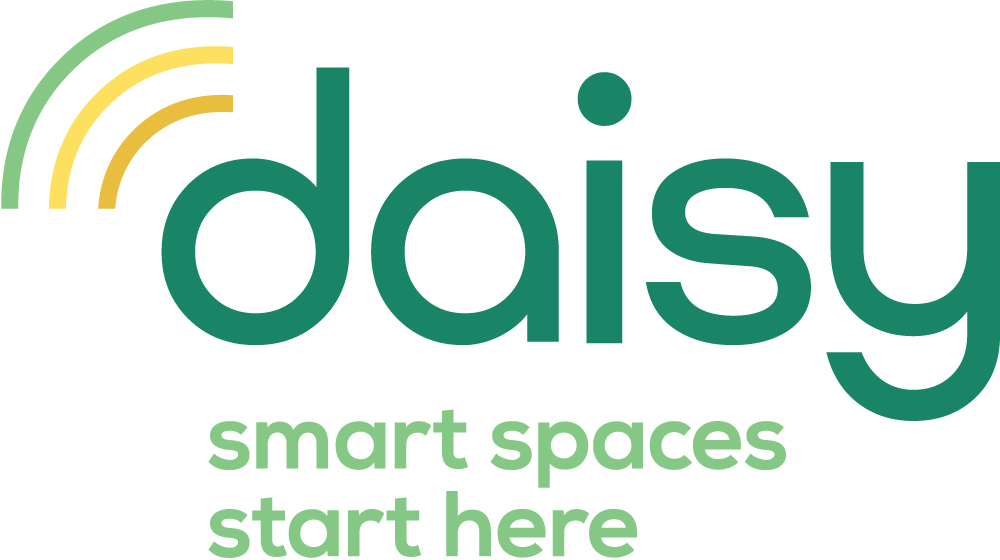
A Different Mindset; Top Integration Talent
I also came to realize that Kappler is approaching custom integration from a completely different mindset. Also evident, Kappler is confident in Daisy’s plan; she is confident in Daisy’s team and, most importantly, she is confident that if the company runs into any unexpected or unforeseen impediment, it will find a way around it.
Part of this confidence stems from the strategy the company has employed to retain top talent in custom integration both as advisors and role-players within the organization. This brain trust consists of brand ambassadors who are former integrators, such as Gordon Van Zuiden (founder of CyberManor) and Greg DellaCorte (former owner2 of DAVCO)…industry experts like Richard Glikes (founder of Azione Unlimited)…as well as executives at both the company-owned locations and their franchisees. That’s a lot of expertise bubbling up to the top.
Lots of Relevant Experience, Some in Technology
As we chatted further, I realized that I had held a misconception about Kappler. I was under the impression that she had no experience in technology or home automation. But in sharing her history with me, I learned that she had worked at Ingersoll Rand, and at that time, they owned both an HVAC company that was looking to integrate with automation…and Schlage Locks, with which many integrators are familiar. So she was not at zero experience when it came to getting involved with home automation.
However, Kappler’s unique background – heavy in successful home services like Terminix and ServiceMaster – clearly shows that she brings a lot of key expertise to this venture. She graduated in 2007 with an MBA from the Darden School of Business at the University of Virginia. Her career started in the early 2000s at Goldman Sachs, a massive financial institution, where she was a financial analyst. In the late 2000s, she took a position at McKinsey & Company, one of the largest business consulting operations in the U.S.
Goldman Sachs & McKinsey
Her positions at Goldman Sachs and McKinsey gave her a firm foundation in finance and a tremendous amount of experience in facing a variety of business situations. She would learn these lessons well and go on to apply them as she continued to elevate her roles and influence in business.
Kappler also told me that in her role at Ingersoll Rand and McKinsey, there was a lot of buzz about, and investigation into, technology opportunities. Much of this talk centered around a rapidly emerging need for system interconnectivity in residential and commercial applications. McKinsey, she said, had done a study that suggested that the Internet of Things business would evolve into a $4 trillion opportunity. That’s trillion…with a “T.”
Resume Could Be the Gold Standard
All of this is to say that she was not a complete technology newbie. She had been actively participating in and studying various technology businesses and opportunities that offered skills that are somewhat transferrable to custom integration.
Kappler has a resume that could be considered the gold standard of business builders. After McKinsey, Kappler’s career ranged from the Category Manager of Global Coffee Strategy and Innovation at Starbucks…to Corporate Strategy Development at United Technologies…to President of ServiceMaster and Merry Maids (both franchises)…and more. These are key executive positions at major brands, with experience on the commercial side and – perhaps more importantly for this venture – on the consumer/residential side.
Why Don’t I Have a Tech Guy?
Above all else, Kappler brings a sensitivity to the end user side of technology. As a user herself, she knows well the joy of when a system is working properly – and the incredible frustration of when it isn’t.
There was a Ring doorbell in a package sitting on my husband’s desk for about three months before we finally spent a weekend kind of cursing and trying to put it in ourselves. But I’m thinking to myself…I have a cleaning lady who shows up once a week to clean the house…I’ve got a landscape guy who comes once a week to cut the lawn…And I have a pest control guy who comes regularly and sprays around the outside of the house to repel bugs. But the most important things to me are: to be able to work from home, to make sure my kids are safe, and to know that my kids can watch Bluey when I need a little bit of peace and quiet on the weekend to play some music.
Why can’t I do that all with the push of a button?…Why don’t I have a tech guy?
Hagan Kappler, Daisy Co-Founder and CEO
It is this question that was the spark that ultimately developed into Daisy.
A Very Popular But Highly Fragmented Business
An interesting dichotomy has developed in our world – technology is popular, studies show the average home has 22 devices – and yet the residential technology integration business is highly fragmented…with no clear market leader. It is a cottage industry, with thousands of local providers offering differing levels of service.
It is that reality that Daisy seeks to disrupt with a better solution. So just exactly what is Daisy? Is it a roll-up? Is it a franchise? Is it both of these? Is it neither of these?
Kappler would likely tell you it is a little of both. But I think it is, in fact, something else altogether. But first, some foundation…
Daisy is VC Funded, NOT Private Equity
As Kappler began working on this idea…a nationally recognized technology service that consumers can rely upon – she ended up getting connected with an executive who was knowledgeable about the world of venture capital. Daisy was born, with an expanding group of venture capitalists backing it.
Important note: Kappler rather forcefully called my attention to the fact that Daisy was NOT funded by private equity. She told me she has no interest in private equity – a world in which she was once involved. Venture capital, she argues, is a much-preferred option for Daisy as they have a much longer horizon on their investments. Venture capital understands that start-up businesses like Daisy take time to develop and grow. Private equity, on the other hand, tends to have a shorter time frame for when they seek to exit their investments.
$20 Million Raised So Far
Recently, Daisy completed a Series B offer which raised $7 million. All told, Kappler and co-founder Dion Perrson have raised a total of $20 million. Investors in Daisy include Bungalow Capital, Goldcrest Capital (other investments include SpaceX), Burst Capital (founders are former Yelp executives), Bullish Co. (from a marketing and advertising background; other investments include Peloton & Nike) – and both Hagan and Dion have invested as well.
What this means is that, at some time, there will be some form of an exit for Daisy’s investors. Typically, this means a public offering, or perhaps a strategic buyout, or some other such option. But that exit is well down the road Kappler tells me. Daisy…is just.getting.started.
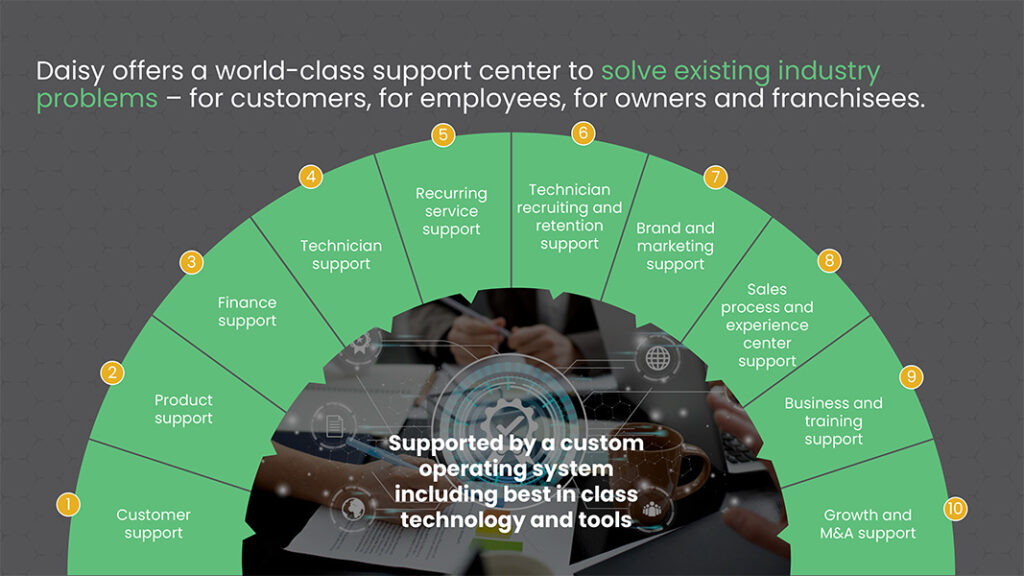
Isn’t Daisy Just Another Roll-Up Attempt?
Many folks in the industry assume that Daisy as just another attempt at a roll-up. A roll-up is a favorite private equity play, where a PE company buys up relatively small independent companies around the company, rolling them up into one national entity. Done correctly, this can grow market share, lower costs, and improve profitability by creating an entity that is more valuable than the sum of its parts. There have been a handful of attempts to create these roll-ups in the custom integration business. Most have failed, while others have muddled along without making significant headway.
The reason people think that this is Daisy’s plan is because the company has in fact acquired eight integration businesses in its first 10 months of operation.
Isn’t Daisy Just Another Franchise Attempt?
Other folks in the industry assume that Daisy is just another attempt to create a franchise operation. A franchise consists of a national brand that offers a consistent product or service around the country through independently owned operators, each of whom has paid that national entity for the right to operate its business using the national brand and products or services. This payment usually consists of an initial investment amount, along with an ongoing royalty that is typically a percentage of revenues.
There have been a handful of companies who have tried to sell franchises, but like roll-ups they have not really had much success. In most cases, these are created by integrators who standardize their operating practices to create a system that they then try to sell others on franchising. But while these companies may have some expertise in integration, they are not experts in the business of franchising
The reason people think that this is Daisy’s plan is because the company has in fact signed up seven franchise locations during its first 10 months of operations.
So Which Is It, Is Daisy a Roll-Up or a Franchise?
On the face of it, it looks like a little of both. I asked Keppler about its recent acquisitions, and she assured me that this is not the ultimate strategy for the company. Typically, in a roll-up, the owner does not plan to stick around post-acquisition. They are selling out, retiring, or otherwise moving on to other things.
“We’re very much a fan of consolidation [roll-up] for industries where it makes sense,” Kappler told me. “And where it makes sense is when you’re able to acquire a business and you’re not reliant on the owner to stick around. Because if the value of the business is reliant on that owner to stay post-acquisition, then that’s pretty risky for a roll-up.”
This is why Daisy’s main strategy is to become the leading national brand of technology integrators via franchising. In franchising, she tells me, owners are more likely to continue to stay engaged in operating their independently owned businesses. Daisy solves so many problems for them, it literally eliminates all the major pain points that can make their businesses stressful. With those issues solved, the owners want to continue to operate their own businesses – and Kappler thinks that is important for the ongoing success of that business.
So Why is Daisy Acquiring Integration Businesses, If It Is Not a Roll-Up?
So if the core strategy is to sell franchises on a nationwide basis, why is Daisy acquiring integration businesses?
“So we are acquiring a base of businesses to form a foundation,” Kappler told me. “We’re building a brand because we think there’s a benefit from having a national brand.”
Daisy’s CEO also told me that the companies that they chose to acquire were often because those owners preferred to be acquired, rather than to become a franchisee. This was typically because they were looking to retire after running their businesses for decades.
Pushing to Build a National Brand
In any event, Kappler went on to describe the necessity for Daisy to rapidly build out its national footprint with key integration businesses in key markets. This will help to build awareness for the Daisy brand around the country. These acquirees are often some of the top integrators in their market. The company-owned locations will then serve as a laboratory for the company to test various tools, policies, programs, and practices in a real-world scenario. Those that are most successful will then be rolled out nationally to all of its franchisees.
A growing national brand will serve to attract more clients, builders, architects, and franchisees to the organization. Right now, the company has eight company-owned locations. Kappler told me that she anticipates acquiring another five to ten locations over the next six to twelve months.
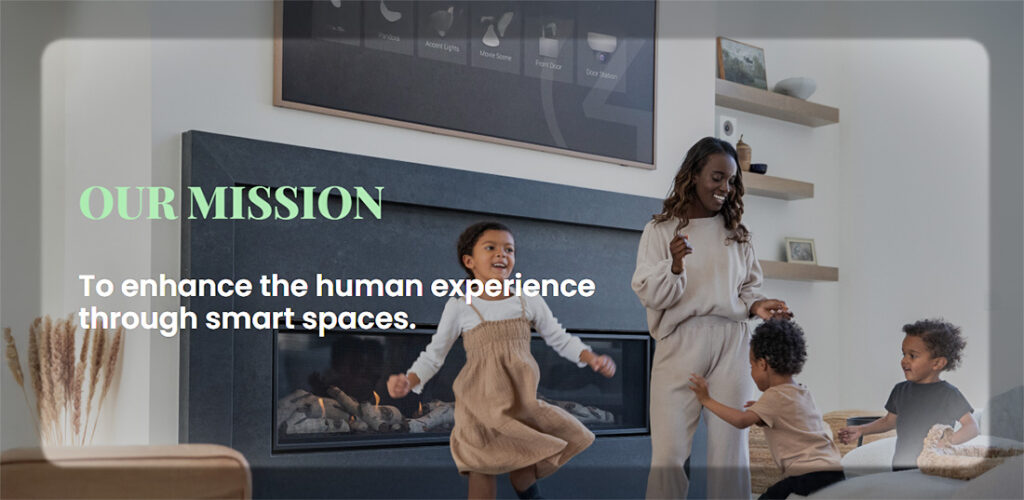
Why Should I Consider Paying to Become a Franchisee?
There are many reasons why an integrator may want to consider investing to become the local Daisy franchisee. But the strongest reason I’ve seen is articulated by Kappler below…
[We are] building out 10 different support centers to address the pain points that we’re finding that owners have. Our ultimate goal is just to give them back their quality of life, and that will ultimately also help to enhance the value of their business – which probably sounds a little contradictory. But if you’re able to kind of get out of the business a little bit and enable the business to run itself because you can rely on our accounting tools, our HR tools…you and your business will benefit from that.
Rebecca, for example, has built an incredible recruiting engine where she’s hiring a dozen techs on a monthly basis.
Kappler
24/7 Customer Support Center
One support center offered by Daisy that I have heard quite a bit about is the company’s call center, available on a 24/7 basis. Clients can reach out to the call center whenever they have an issue and immediately speak with a Daisy tech. This not only ensures speedy and effective support for the client, but it takes the headache of offering such a service off the franchisee’s back. Of course, depending on the severity of the issue, Daisy’s call center may need to reach out to the company owner, but in most cases, this is not necessary.
The company is also offering franchisees tech support, finance support, brand and marketing support, business and training support, technician recruiting and retention support, and much more.
Daisy is a New Kind of Company
I think an argument can be made to suggest that Daisy is neither a roll-up nor a franchise…it is something entirely new. As Kappler told me, “We really do want to create a whole new category, which would be an ongoing service that we don’t think exists today.”
Will Daisy succeed? I don’t know…integration is a crazy cottage industry that is highly fragmented with many owners entrenched in their own ways of doing things. The economics of it all can be challenging.
Sounds Pretty Compelling
However, Daisy’s emphasis on lifetime client support and the systems to make that happen easily and efficiently makes a lot of sense. I think the Daisy management team’s experience in finance, business, strategy, and franchising is unique. I think the fusion of this experience with top industry integrators to create newly conceived best practices that demonstrate greater empathy for the end user, could be powerful.
Combining all of this with a national brand footprint, efficient processes, and a better business strategy sounds pretty compelling. Success will be based more on its ability to effectively execute – than on the strength of the plan itself.
A $6 Billion Business
Kappler says she’s seen data that shows custom integration is a $30 billion business. I don’t know if that’s true or not, but if Daisy can capture 20% market share, that would make them a $6 billion business. That’s not shabby…
If you are an existing integration business and would like to learn more about becoming a Daisy franchise, go to daisyco.com/for-integrators/.
If you are interested in starting a new business, visit daisyco.com/franchising/.



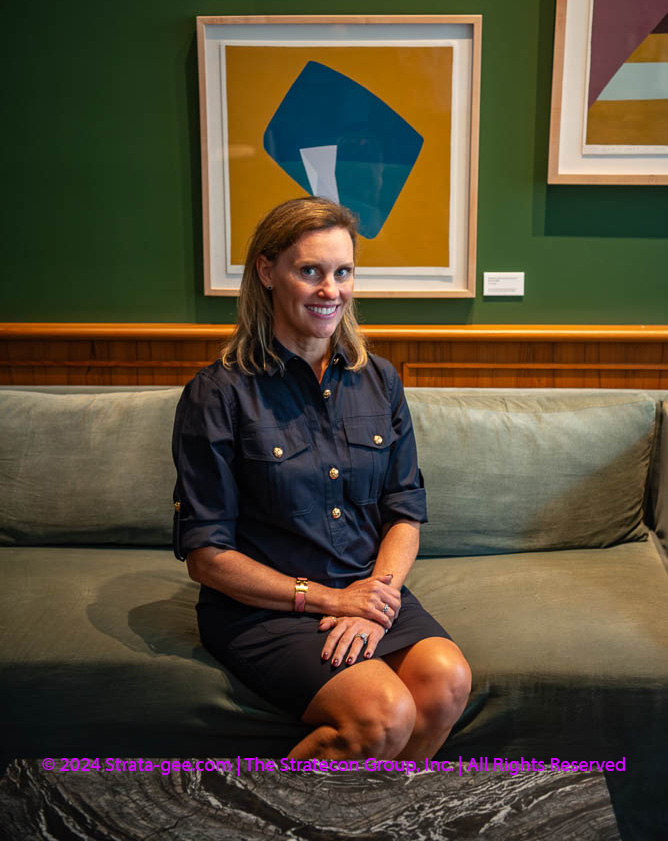


As you suggest, Ted, this is a very challenging space to enter. One daunting problem is that “smart home” iOT devices have steadily gotten better and less costly. Simply Safe, SONOS, Nest, Lutron (with products like Caseta switches), Phillips Hue, Amazon, Google and many others deliver the promise of a connected home for very little cost. TVs are fully smart these days – plug them into power, put them on your network and without any external boxes you have all the content in the world delivered with a large app-based GUI, again at very low cost relative to a few years (weeks?) ago. A sound bar is often the audio complement to that TV. The upper-middle class customer has all but disappeared from the CI space as a result. This has pushed the value-added, service-oriented CI dealers to ever more involved, true luxury home projects, selling a broader array of products to a smaller group of clients.. It is VERY hard to scale this business or to remove the principal business driver, the owner, and carry on successfully.
Time will tell. I wish them luck!